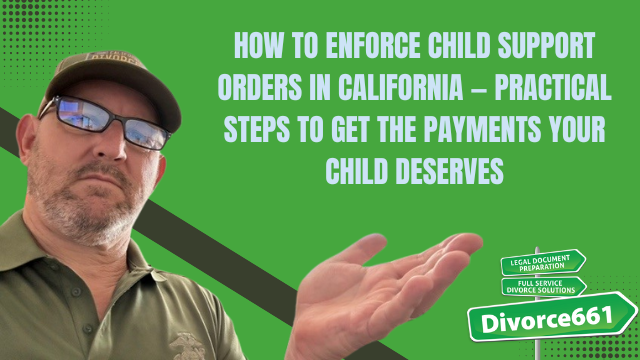How to Enforce Child Support Orders in California — Practical Steps to Get the Payments Your Child Deserves
I’m Tim Blankenship from Divorce661. If your ex has stopped paying court-ordered child support in California, don’t panic—you have options. In this article I’ll walk you through the enforcement tools available, explain how they work, and outline practical steps you can take to enforce a child support order and protect your child’s financial future.
Why enforcement matters
Unpaid child support impacts more than just bank accounts. It affects your child’s housing, education, medical care, and overall stability. Even with a judgment or court order in place, non-payment is unfortunately common. The good news is that California law provides several enforcement mechanisms to help you collect what is owed.
Enforcement tools available in California
Here are the primary tools courts and child support agencies use to compel payment:
- Filing an enforcement request with the court — This starts the legal process to recover unpaid support and is often the first step.
- Wage garnishment / wage assignment — The court or child support agency can order the payer’s employer to deduct child support directly from their paycheck, ensuring steady payments.
- Liens on property — A lien can be placed on real property or other assets to secure unpaid child support until the debt is satisfied.
- Suspension of driver’s license or professional licenses — The state can suspend driving privileges or professional licenses to encourage compliance.
- Interest on unpaid amounts — Unpaid child support typically accrues interest, increasing the urgency to collect what’s owed.
How to start the enforcement process
Follow these practical steps to enforce a child support order in California:
- Review your existing child support order — Confirm the terms, the amounts due, and any arrears already documented. This helps identify what to request in your enforcement filing.
- Gather documentation — Collect pay stubs, communication records, court orders, and any proof of non-payment to support your request.
- File an enforcement request — Submit the enforcement paperwork to the court. This can be done through the county family law court or with assistance from a legal service.
- Request specific remedies — Ask the court for wage garnishment, a lien, license suspension, or other remedies based on what is likely to be effective in your situation.
- Coordinate with local child support agencies — County child support agencies can help enforce orders, issue wage assignments, and work directly with employers.
Real case example
We recently helped a parent who hadn’t received child support for over six months. After filing the enforcement request, the court issued a wage assignment and the payer’s employer began deducting payments directly from wages. Payments started flowing again—and reliably. This gave the custodial parent immediate financial stability and peace of mind.
Common questions and quick answers
How long does enforcement take?
Timelines vary. Wage garnishments can be implemented quickly once the court issues an order, but other remedies like liens or license suspensions may take longer depending on court schedules and administrative processing.
Will unpaid support continue to accumulate?
Yes. Unpaid child support usually accrues interest until paid in full, which increases the amount owed over time. That’s why prompt enforcement is important.
Do I need a lawyer?
You don’t always need a lawyer, but professional help can ensure paperwork is filed correctly and quickly. Many parents choose document-preparation services or legal assistance to avoid delays and mistakes.
How Divorce661 can help
At Divorce661 we specialize in flat-fee legal document preparation and court filing assistance. We prepare enforcement paperwork accurately, coordinate with local child support agencies, and help you move the process forward efficiently.
- Flat-fee legal document prep
- Professional, accurate court filings
- Coordination with child support agencies
- Fast preparation to get enforcement started quickly
“We filed the enforcement request, the court issued a wage assignment, and payments started flowing again—reliably and on time.”
Next steps
If you’re not receiving the child support you’re owed, take action now. Start by reviewing your order and gathering documentation. If you want help preparing and filing enforcement paperwork, visit Divorce661.com for a free consultation. We’ll help you enforce your rights and protect your child’s financial future.
Contact
Divorce661 — Free consultation: Divorce661.com

